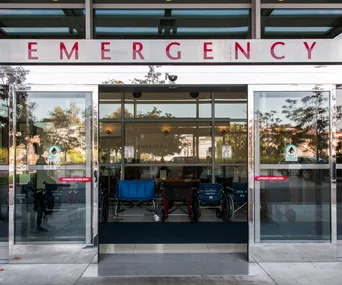On 14 April 2014, Amy May Shead’s life was about to change irrevocably.
The bright and beautiful young TV producer was at dinner with some friends while they were on holiday in Budapest, Hungary, when she unwittingly took a bite of food that contained nuts. This caused an anaphylaxis reaction that was so severe Amy suffered a cardiac arrest. Her heart stopped beating and she was pronounced dead for six minutes.
The young woman from the UK was put in an induced coma and tragically sustained a brain injury from the lack of oxygen.
Amy, now 29, has appeared on the TV show she used to produce – This Morning – to raise awareness of the catastrophic effects nut allergies can cause.
While Amy can understand what’s being said, she’s unable to communicate due to her brain injury.
Heartbreakingly, her mother recounted Amy’s story for her. WATCH BELOW:
Sue Shead said her daughter always carried an allergy card in multiple languages, along with two EpiPens.
Amy had also triple checked there were no nuts in her food by handing restaurant staff a note in Hungarian explaining her severe allergy. They assured her there was no nuts in her food.
Presenter Ruth Langsford comforted a visibly distressed Amy throughout the interview.
Her family have set up the Amy May Trust to help fund the cost of Amy’s treatment. They’ve been privately financing her medical bills as Amy was unable to receive medical insurance because of her condition. They were also unable to sue the restaurant given there is no compulsory public liability insurance in Hungary.
The brave young woman and her mother Sue are also petitioning to ban nuts on airplanes. The online campaign page reads:
“Airlines are a confined space and a unique environment compared to all other modes of transportation. Unlike other forms of both private and public transport, or open spaces (all of which can be fatal to a nut allergy sufferer), an airline is an airtight tube within which the ventilation system can cause serious consequences to passengers who may be affected by contaminated air. Equally, if a reaction takes place onboard, the patient will require urgent and time-sensitive medical care, often within moments of the reaction taking place, even with personal medication such as an EpiPen, reaching a hospital within the required time is an unfeasible solution when thousands of miles in the air.”
The petition needs 50,000 signatures and at time of publishing, had already amassed over 42,000. You can sign it here.





